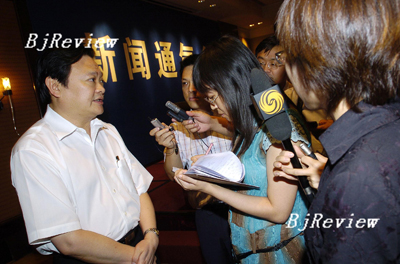
It is almost certain that the labor scandal in Shanxi Province wouldn't have been uncovered if the media had remained silent. According to Caijing magazine, some 8,320 reports filed by various media outlets across China were available on the Internet in early July, less than one-and-a-half months after the scandal was exposed. The number of Web pages covering the scandal had totaled 6.92 million by that time, the magazine reported.
Yu Youjun, Governor of Shanxi, acknowledged that the media had played an important role in exposing the scandal on June 22. Analyzing what had happened, Yu said the government was plunged into an embarrassing situation because of its failure to follow the report on the media.
Under severe pressure from public opinion, Yu, an aspirant civil servant who had just taken office, made public apologies to the Central Government, the victims and their family members and to the people of Shanxi.
For years, media organizations have been nothing but government propaganda machines. However, as China embraces the rule of law and as the market mechanism is introduced to the media sector, the media has increasingly become a watchdog for public interests and is playing an ever-more prominent role.
Last month, algae outbreaks in Taihu Lake in Wuxi in east China's Jiangsu Province contaminated the drinking water supply in the city. Local residents rushed to purchase purified water in stores, giving rise to a public panic. In the beginning, the local government attributed the algae bloom to global warming. Later, however, the media uncovered that it was in fact primarily a man-made disaster. A large number of polluting enterprises that had been closed down were able to reopen because of the local government's obsession with economic growth and some government departments' inefficient supervision over the enterprises. Consequently, the lake, which it took the Central Government some 10 billion yuan and over 10 years to clean, was reduced to what it had been. Amid fierce media criticism, five local officials were removed from their posts and the rehabilitation of Taihu once again topped the agenda of both the Central Government and the local government.
The "nail house" issue in Chongqing is another compelling illustration of the media's power. An ordinary couple whose house was targeted for demolition to make way for a shopping center was unsatisfied with the government's compensation and refused to leave their home citing "private property rights protection." As media outlets vied to cover the landmark case, leading officials of the local government abandoned their tough approach with the couple. After several rounds of negotiations, the hotly contested issue ended with the rights-conscious homeowners leaving their house contentedly.
There is no doubt that stumbling blocks hindering the media from checking the government still exist in some regions of China. However, the environment is becoming relaxed, as more senior officials show tolerance.
The Standing Committee of the National People's Congress, China's top legislature, took out provisions forbidding the media from releasing "irregular reports" on emergencies from the draft law on emergency response in June. The committee held that the vague provisions might be used by local governments to prevent the media from objective reporting.
"Give the media a say, and the skies won't cave in," stated a spokesman from the Ministry of Public Security addressing the issue of supervision by public opinion. In stark contrast to his daring and confident remarks, most Chinese officials have been extremely cautious about the media, while holding on to the so-called "unspoken rules of officialdom," which include "guard against fire, burglars and journalists."
Li Yizhong, Minister of the State Administration of Work Safety, recently said that the media are not expected to be infallible. Thanks to the liberal mindset of the minister, coalmine disasters have been thrust into the media spotlight.
Along with deepening economic globalization, the Chinese Government has come to realize the media's role in fostering an image of the state and enhancing its soft power. It is trying to improve the government spokesperson system by making public their office telephone numbers and giving them formal training so that they can work better with the media. The Chinese Government is now increasingly able to hold press conferences immediately after breaking news events that have negative repercussions in the international community. It is particularly serious about the needs of the mainstream international media.
Not long ago, China adopted the Regulations on Government Information Disclosure to be put into effect on May 1, 2008. Committed to the universally recognized principle that "disclosure is the rule and non-disclosure is an exception to the rule," the regulations are expected to lay a legal groundwork for the media's supervision of the government.
Despite progress, inherent problems still persist. First and foremost, most Chinese media organizations are affiliated to the government. As a result, they can only target lower government levels and prefer scrutinizing other regions to avoid the political pressure from the local government.
These problems were evident in the forced labor scandal in Shanxi. In fact, the illegal brick kilns had been in operation in some areas in the province for nearly a decade. The local media had long been aware of the issue. However, they chose to be silent for fear of political risks. It was not until Fu Zhenzhong, a reporter with Henan TV, a television station based in neighboring Henan Province, uncovered the scandal that the local media began to follow suit. | 